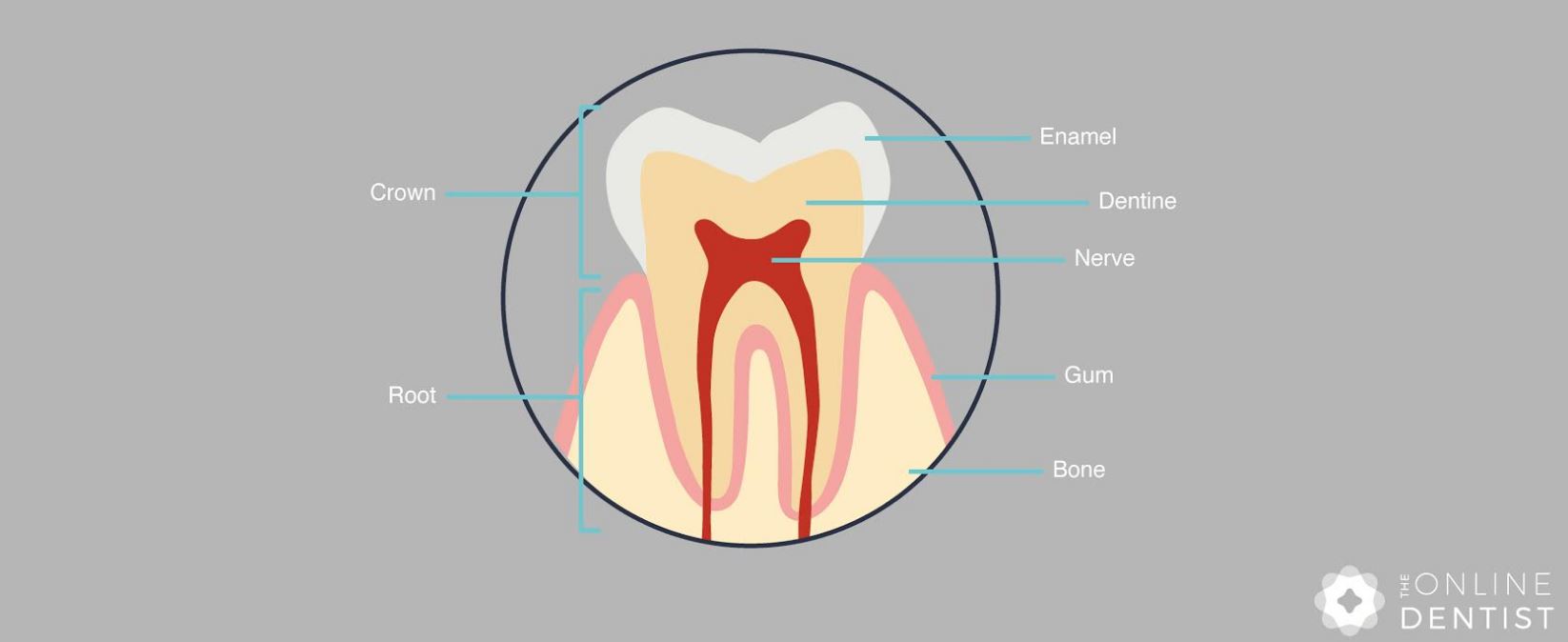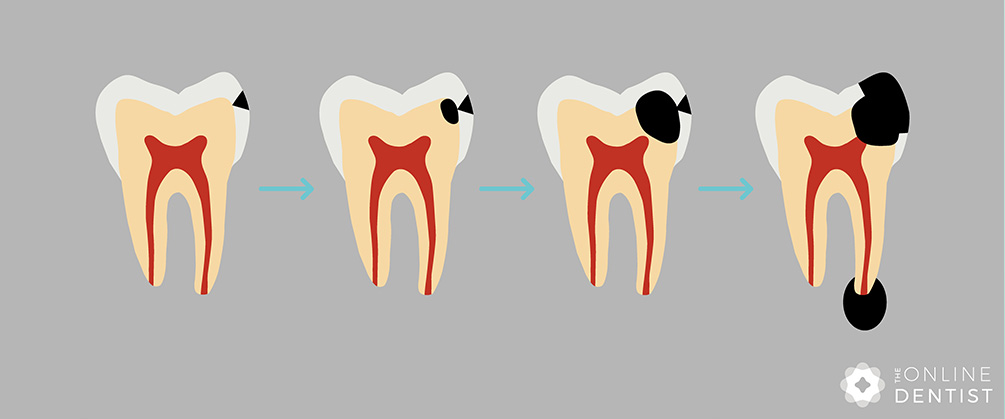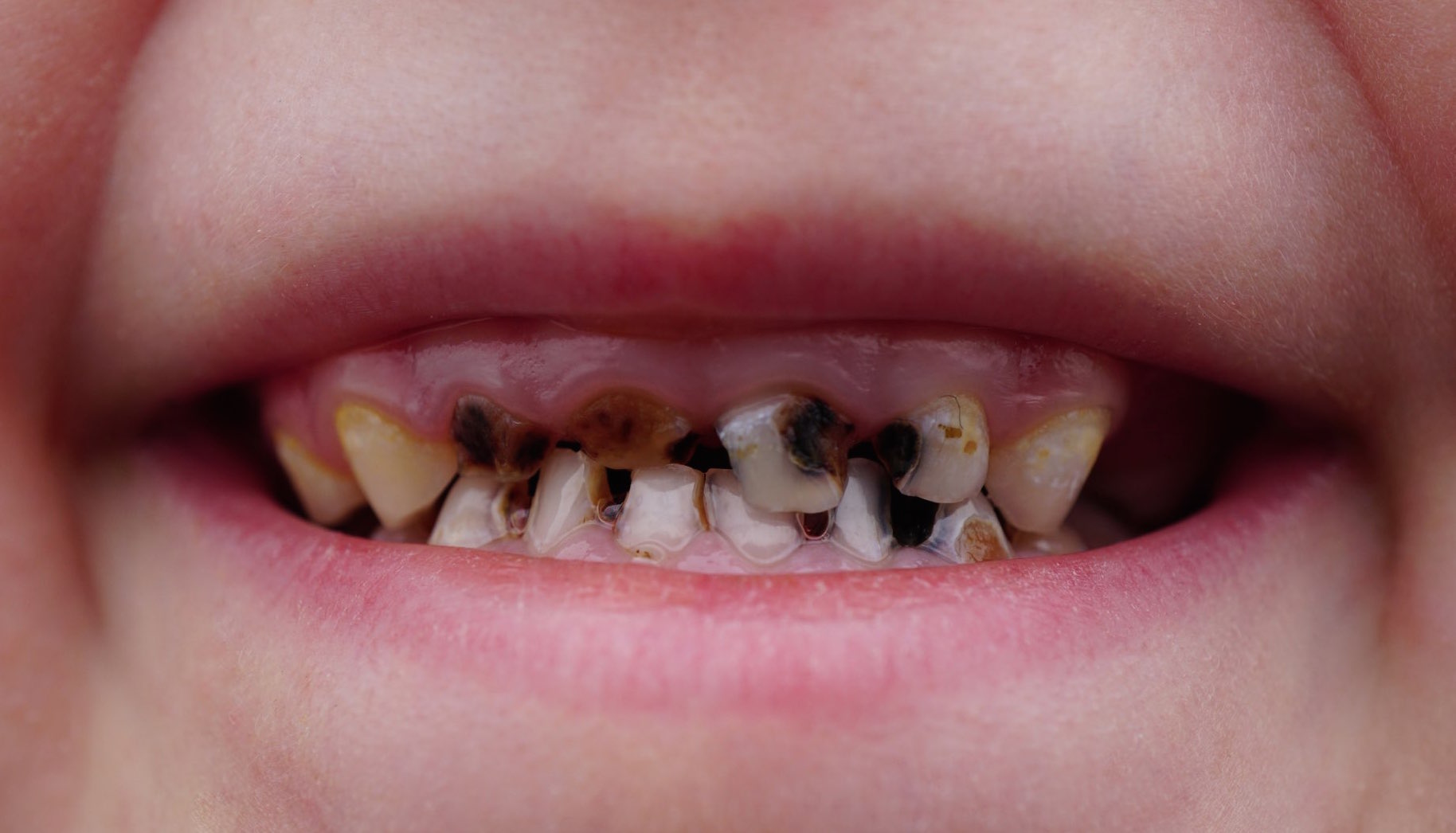Tooth decay is when bacteria cause a hole in a tooth.
Teeth are made up of several layers. The outermost layer is called enamel, and the layer below is called dentine. The innermost area is called the pulp, or nerve, of the tooth.

When we eat or drink anything containing sugars, the bacteria in dental plaque produce acid. If you frequently eat sugars, over time the acid can form a hole, or ‘cavity’ in your tooth. This hole can progress into the enamel, dentine or even the pulp.
What causes tooth decay?
As mentioned above, sugary foods, if consumed often, leave the teeth vulnerable to acid attack. Repeated and frequent acid attack can cause a hole, or cavity, in the tooth.
Not cleaning your teeth regularly allows plaque to build up on the surface of teeth. Plaque is made up of the acid-forming bacteria that attack the teeth.
A lack of saliva, or a dry mouth, can be caused by certain medical conditions or medications. Teeth in a dry mouth are more vulnerable to decay as they don’t benefit from the protective properties of saliva. If you experience dry mouth, it may be worth talking to your dentist about extra measures you can take to prevent decay.
How can I avoid tooth decay?
The age-old advice of limiting the amount of sugary foods you eat still stands. It is important to limit both the amount of sugary foods you eat, and how often you eat them throughout the day. Each time the teeth are exposed to sugar, they are vulnerable to acid attack for 20 minutes after.
Brushing your teeth twice a day and cleaning in between the teeth with floss or interdental brushes is the best way to prevent plaque build-up. Read the back of your toothpaste to make sure it has fluoride in it, as fluoride is very important in the fight against decay. It helps to prevent decay and to the strengthen the teeth against acid attack.
What does tooth decay feel like? How will I know if I have a cavity?
At first, you may not feel anything. It is important to attend the dentist regularly for a check-up, as any early decay can be spotted while the cavity is still small.
If the decay progresses, you may notice some mild pain. The pulp, or nerve, of the tooth becomes inflamed due to the bacteria in the decay. In this case, you may feel some short, sharp pain that disappears quickly when you are eating cold or sweet things.
If the decay progresses even further, you may feel a more intense pain that persists for some time. The pulp, or nerve, is irreversibly inflamed because the decay has progressed deep into the tooth. In severe cases, an abscess may form, causing pain and swelling.
The progression of tooth decay

What are the treatments for tooth decay?
If the decay is caught very early, your dentist may be able to recommend thorough brushing, flossing and a toothpaste with fluoride to stop the decay progressing further. They will also chat about limiting the amount and frequency of sugary food that you eat.
If the tooth is causing some short, sharp pain, it is treated by placing a filling. A filling is when the decay is cleaned out of the tooth, so it cannot progress any further, and another material is put in its place.
However, if the tooth is causing intense pain that persists, it is treated by removing the irreversibly inflamed nerve. The nerve is removed by having root canal treatment or by having the tooth removed.
What should I do if I am concerned that I have a cavity?
It is always a good idea to regularly see your dentist for a thorough check of your teeth and a chat about any concerns!
Keep updated with the Online Dentist newslettersign up today
Recent Articles
 Tooth decay is when you get holes (also known as cavities) in your teeth. This is caused by bacteria in plaque. It’s one of the main reasons why you need...
Tooth decay is when you get holes (also known as cavities) in your teeth. This is caused by bacteria in plaque. It’s one of the main reasons why you need...
 NB: If you come to this section in a rush because someone has knocked an adult tooth completely out, go to ‘Knocked out adult tooth’ article. Of course young children...
NB: If you come to this section in a rush because someone has knocked an adult tooth completely out, go to ‘Knocked out adult tooth’ article. Of course young children...




